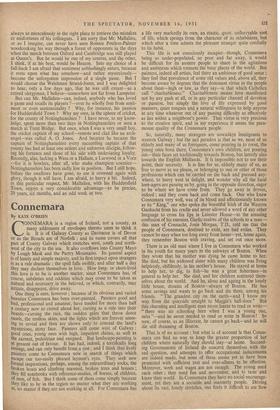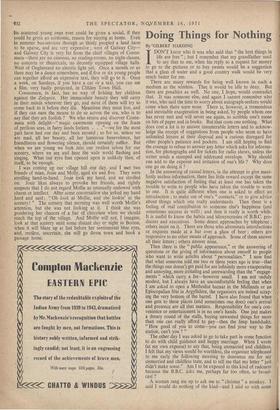Connemara
By KATE O'BRIEN CONNEMARA is a region of Ireland, not a county, as many addressers of envelopes thereto seem to think it is. It is of Galway County as Dartmoor is of Devon or as the Broads are of Norfolk ; and its name covers all that part of County Galway which stretches west, south and north- west of the city to the sea. It also overflows into County Mayo by Lough Mask and the Partry Mountains. Its general aspect is of lonely and simple majesty, and its first impact upon strangers is as a rule \dramatic ; the spell falls swiftly, and after half a day they may declare themselves in love. How long- or short-lived this love is to be is another matter, since Connemara has, of course, subtleties and oddities which may come to be taken as natural and necessary in the beloved, or which, contrarily, may irritate, disappoint, drive away. . One thing is sure, however ; because of its obvious and varied beauties Connemara has been over-painted. Painters good and bad, professional and amateur, have tended for more than half a century now to crowd about her, cursing as a rule into their beards—cursing the rain, the sudden gales that throw down easels, the restless skies, and the lights which are forever seem- ing to reveal and then are shown only to conceal the land's mysterious, stony face. Painters still come west of Galway; good ones, young ones with high, impatient claims, as well as the earnest, pedestrian and resigned. But landscape-painting is at present out of favour. It has had, indeed, a terrifically long innings, and can only benefit from a rest ; and I think that lively Painters come to Connemara now in search of things which escape our too-easily pleased laymen's eyes. They seek new formal inspirations, perhaps, among the extraordinary rocks, the broken boats and climbing seaweed, broken trees and houses ; they fill notebooks with reference-studies, of horses, of children, of men, of fish. But I think some of them come simply because they like to be in the region no matter what they are working at, no matter if they are not workihg at all. For Connemara has a life very markedly its own, an elastic, quiet, unflurryable sort of life, which springs from the character of its inhabitants, but which after a time admits the pleasant stranger quite cordially to its habit.
This life is not consciously escapist—though, Connemara being so under-populated, so poor and far away, it would be difficult for its austere people to share in the agitation5. and ambitions which torment the busy places of the world. Bu painters, indeed all artists, feel there an ambience of good sense• they feel that prevalence of some old values and, above all, the become aware by degrees that the dominant virtue in the peopl about them—high or low, as they say—is that which Catholi call "charitableness." Charitableness means love manifeste not by any gush at all, or in any particular channel of devotion or passion, but simply the love of life expressed by good manners, quiet tongues and a natural willingness to help anyone at any time whatever out of any passing difficulty as effectivel as lies within a neighbour's power. That virtue is very precious to the creative spirit, and in my experience it seems the para.* mount quality of the Connemara people.
• So, naturally, many strangers are nowadays immigrants to western Galway; but the sad paradox is that as we, most of us elderly and many of us foreigners, come pouring in to roost, the young ones born there, Connemara's own children, are pouring out—their faces set traditionally towards Boston, but latterly also towards the English Midlands. It is impossible not to see thei point, their necessity. It is fine for us, elderly many of us, a free to move as we please, or belonging to one or other of thos professions which can be carried on the back and pursued any where, to hurry west in delight, and wonder why all the loca teen-agers are passing us by, going in the opposite direction, eager to be where we have come from. They go away in droves, indeed ; and they come back and come back. One who knew, Connemara very well, was of its blood and affectionately kno as its "King," one who spoke the beautiful Irish of the Western Gaeltacht from his cradle and never allowed a word of any other language to cross his lips in Leinster House—to the amusing confusion of his enemies, Gaelic zealots of the schools to a man— this man of Connacht, Josie Morgan, T.D., told me that the people of Connemara, destined to exile, are bad exiles. The cannot be easy when too long away from home—yet, home again they remember Boston with craving, and set out once more.
There is an old man where I live in Connemara who worked in his youth for many years in the subways of Boston. Whe they wrote that his mother was dying he came home to her. She died, but his widowed sister with many children was living helplessly, shiftlessly, in his mother's house. He stayed at home to help her, to dig, to fish—he was a great fisherman—in general to help her. She died, and her children scattered them- selves about the world. And he, alone and ageing in the lonely,•little house, dreams of Boston—always of Boston. He has some savings and wants to go back and die there, among his friends. "The grandest city on the earth—and I know my way from the quayside straight to Maggie's hall-door." But this charming and intelligent man never ,learnt to read or write- " there was no schooling here when I was a young on miss "—and he never needed to read or write in Boston! SO now, of course, as an illiterate, he cannot go back—and he w die still dreaming of Boston.
That is of no account ; but what is of account is that Conne- mara can find no way to keep the greater proportion of he children where naturally they should stay—at home. Succeed- ing Governments of Ireland do concern themselves with the sad question, and attempts to offer occupational inducements are indeed made, but none of these seems yet to have been promoted .with sufficient zest and over-allness to be effective. Moreover, work and wages are not encwh. The young need each other ; they need fun and movement, and to taste and know their world. In Connemara they have no social encourage- ment, yet they are a sociable and mannerly people. Driving about its vast, lonely stretches, one finds it difficult to see how its scattered young ones ever could be given a social, if they 'could be given an economic, reason for staying at home. Even in summer bus-services through so thinly peopled a land have to be sparse, and are very expensive ; west of Galway City— and Galway City is very far from the chief villages of Conne- mara--there are no cinemas, no reading-rooms, no night-classes, no concerts or theatricals, no decently equipped village halls. West of Oughterard no electric light yet. ,Once a month or so there may be a dance somewhere, and if five or six young people can together afford an expensive taxi, they will to to it. Once a week, on Sundays, if you have a car or a taxi, you can seP a film, very badly projected, in Clifden Town Hall. Connemara, in fact, has no way of holding her children against the Zeitgeist. Her immaculate beauty they will carry in their minds wherever they go, and most of them will try to come back to it before they die. Meantime they must live, and if they can earn the means to do so across the sea, who is to say that they are foolish ? We who return and discover Conne- mara with delight—" magic casements opening on the foam of perilous seas, in faery lands forlorn . . ."—we for the most part have had our day and been around ; so for us, unless we are mad, all her beauty, all her luminous benevolence, her friendliness and flowering silence, should certainly suffice. But when we are young we look into our restless selves for our scenery, where we see and hear 'the wide world flashing and singing. What our eyes firet opened upon is unlikely then, of itself, to be enough.
I was coming up our village hill one day, and I met two friends of mine, Josie and Molly, aged six and five. They were strolling hand-in-hand. Josie took my hand, and we strolled on. Josie likes always to provoke her friends, and rightly suspects that I do not regard Mollie as unusually endowed with charm or intellect. After some conversation she jerked my hand hard and said: "Oh look at Mollie, and she lookin' at the scenery! " The scenery that morning was well worth Mollie's attention, but she was not looking at it. I think she was pondering her chances of a bar of chocolate when we should reach the top of the village. And Mollie will not, I imagine, look at that scenery until some distant day or night in Boston, when it will blaze up at last before her sentimental blue eyes, and, restless, uncertain, she will go down town and book a passage home.















































































 Previous page
Previous page